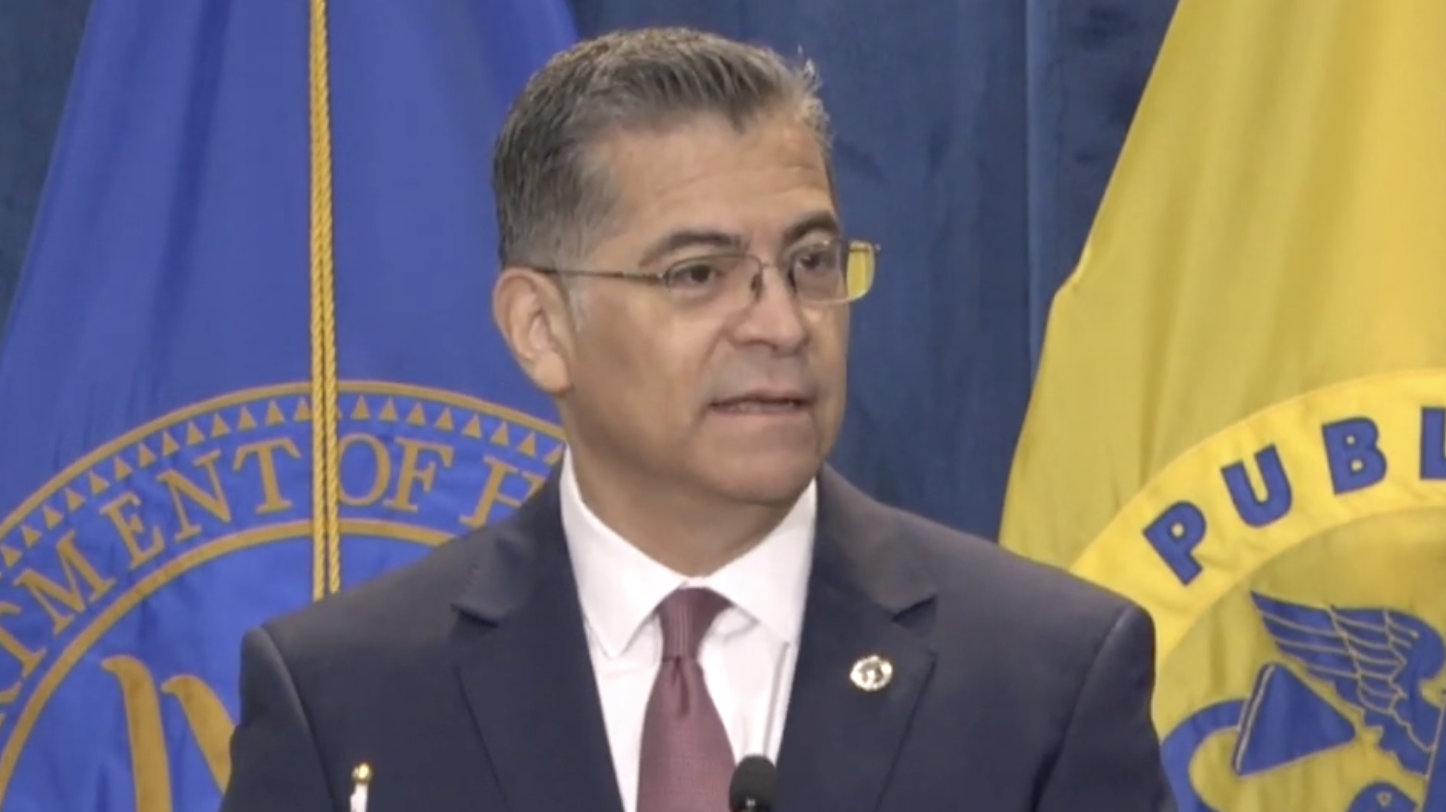Federal Government
New HHS smoking cessation framework is focused on ‘most vulnerable’ populations
Smoking rates are higher for LGBTQ youth and adults

The U.S. Department of Health and Human Services introduced a new 28-page Framework to Support and Accelerate Smoking Cessation on Friday, an effort to support the Biden-Harris administration’s Cancer Moonshot, which aims to cut cancer-related deaths by at least 50 percent over 25 years.
“This framework focuses on advancing equity, engaging communities, and coordinating, collaborating, and integrating evidence-based approaches across every facet of our government and society,” HHS Secretary Xavier Becerra said in a press release.
“The Biden-Harris Administration will continue these efforts,” he said, “until smoking is no longer the leading cause of preventable death in the United States, and the communities that remain the most vulnerable get the help they need.”
The department’s assistant secretary for health, Adm. Rachel Levine, said, “Today’s announcement marks an important milestone reaffirming our commitment to helping people who smoke to quit by working to maximize their access to and awareness of evidence-based interventions and programs.”
According to the Centers for Disease Control and Prevention, which is a division of HHS, about 15.3 percent of lesbian, gay, and bisexual adults smoke cigarettes, a figure that is “much higher” than the 11.4 percent of heterosexual adults who do. Lesbian, gay, and bisexual middle and high school aged youth are also likelier to smoke than their straight counterparts.
Additionally, a 2017 study in the American Journal of Preventative Medicine found that 39.7 percent of transgender adults reported using cigarettes, cigars, or e-cigarette products in the last 30 days, and use of e-cigarettes is four times higher compared to use by cisgender adults.
As a result, the CDC reports that LGBTQ people “have more risk factors for cardiovascular (heart and blood vessel) disease – like high blood pressure – than straight adults.”
The agency warns that “if you are part of the LGBTQ+ community, you likely have seen tobacco ads in magazines, newspapers, and websites directed at you” because “Tobacco companies are focusing their advertising on your communities.”
Evidence suggests LGBTQ smokers may also be less likely to call tobacco quitlines, and fewer are using counseling or smoking-cessation medications.
HHS’s framework document also notes the disparities in cigarette smoking among LGBTQ adults, along with other populations who are likelier to smoke including Black men, blue collar or service industry workers, and adults living in rural areas.
The authors also highlight, in a list of existing HHS programs and activities for smoking cessation, the CDC’s National Networks Driving Action: Preventing Tobacco- and Cancer-Related Health Disparities by Building Equitable Communities.
The program “funds a consortium of national networks to advance the prevention of commercial tobacco use and cancer in populations experiencing tobacco- and cancer-related health disparities” and lists LGBTQ people among the “focus population groups.”
According to the HHS press release, “The Framework is organized around six goals that serve as a foundation for long-standing HHS efforts to support and promote smoking cessation”:
- Reduce smoking- and cessation-related disparities.
- Increase awareness and knowledge related to smoking and cessation.
- Strengthen, expand, and sustain cessation services and supports.
- Increase access to and coverage of comprehensive, evidence-based cessation treatment.
- Advance, expand, and sustain surveillance and strengthen performance measurement and evaluation.
- Promote ongoing and innovative research to support and accelerate smoking cessation.
Federal Government
Biden-Harris administration takes major step toward reclassifying marijuana
New regulations could lessen criminal penalties for cannabis

The U.S. Department of Justice on Thursday took a major step toward loosening the federal government’s regulation of marijuana by issuing a Notice of Proposed Rulemaking to the Drug Enforcement Administration, which outlines a proposal to reclassify it under the federal Controlled Substances Act.
The move comes pursuant to the Biden-Harris administration’s April 30 announcement of plans to recategorize cannabis as a Schedule III substance, which could substantially lessen the criminal penalties for those convicted of using, possessing, selling, distributing, or cultivating the drug.
A 60-day public comment period will begin after the NPRM is published on the Federal Register, along with a concurrent review of the proposed regulatory reforms by an administrative law judge assigned by the DEA.
Since the CSA was passed in 1971, cannabis has been listed under Schedule I, the category reserved for drugs that are considered to be the most dangerous and lacking any currently accepted medical use in the U.S.
In a press release, a senior administration official noted that “marijuana is currently classified higher than fentanyl and meth – the drugs driving our Nation’s overdose epidemic.”
President Joe Biden posted a video on X in which he said the proposal to house cannabis under the Schedule III regulatory regime constitutes “an important move towards reversing longstanding inequities.”
“Today’s announcement builds on the work we’ve already done to pardon a record number of federal offenses for simple possession of marijuana,” the president said. “It adds to the action we’ve taken to lift barriers to housing, employment, small business loans, and more for tens of thousands of Americans.”
“Look folks no one should be in jail for merely using or possessing marijuana,” Biden said. “Period.”
The president added, “Far too many lives have been upended because of a failed approach to marijuana and I’m committed to righting those wrongs. You have my word on it.”
Too many lives have been upended because of our failed approach to marijuana.
— President Biden (@POTUS) May 16, 2024
So today, the @TheJusticeDept is taking the next step to reclassify marijuana from a Schedule I to a Schedule III drug under federal law.
Here's what that means: pic.twitter.com/TMztSyyFYm
Federal Government
US Census Bureau testing survey on LGBTQ households
Agency proposing questions about sexual orientation and gender identity

The U.S. Census Bureau is seeking public comment on a proposed test of sexual orientation and gender identity questions on the American Community Survey. The test would begin this summer and continue into next year.
The Census Bureau published the request as a Federal Register notice. In its press release the agency noted that the ACS is an ongoing survey that collects detailed housing and socioeconomic data. It allows the Census Bureau to provide timely and relevant housing and socioeconomic statistics, even for low levels of geography.
As part of the process for adding new questions to the ACS, the Census Bureau tests potential questions to evaluate the quality of the data collected.
The Census Bureau proposes testing questions about sexual orientation and gender identity to meet the needs of other federal agencies that have expressed interest in or have identified legal uses for the information, such as enforcing civil rights and equal employment measures.
The test would follow the protocols of the actual ACS — with one person asked to respond to the survey on behalf of the entire household. These particular questions are asked about people 15 years of age or older. Households are invited to respond to the survey online, by paper questionnaire or by phone.
The current Federal Register notice gives the public a final opportunity to provide feedback before the Census Bureau submits its recommendations to the Office of Management and Budget for approval. The public may provide feedback through May 30 online.
Federal Government
Republican state AGs challenge Biden administration’s revised Title IX policies
New rules protect LGBTQ students from discrimination

Four Republicans state attorneys general have sued the Biden-Harris administration over the U.S. Department of Education’s new Title IX policies that were finalized April 19 and carry anti-discrimination protections for LGBTQ students in public schools.
The lawsuit filed on Tuesday, which is led by the attorneys general of Kentucky and Tennessee, follows a pair of legal challenges from nine Republican states on Monday — all contesting the administration’s interpretation that sex-based discrimination under the statute also covers that which is based on the victim’s sexual orientation or gender identity.
The administration also rolled back Trump-era rules governing how schools must respond to allegations of sexual harassment and sexual assault, which were widely perceived as biased in favor of the interests of those who are accused.
“The U.S. Department of Education has no authority to let boys into girls’ locker rooms,” Tennessee Attorney General Jonathan Skrmetti said in a statement. “In the decades since its adoption, Title IX has been universally understood to protect the privacy and safety of women in private spaces like locker rooms and bathrooms.”
“Florida is suing the Biden administration over its unlawful Title IX changes,” Florida Gov. Ron DeSantis wrote on social media. “Biden is abusing his constitutional authority to push an ideological agenda that harms women and girls and conflicts with the truth.”
After announcing the finalization of the department’s new rules, Education Secretary Miguel Cardona told reporters, “These regulations make it crystal clear that everyone can access schools that are safe, welcoming and that respect their rights.”
The new rule does not provide guidance on whether schools must allow transgender students to play on sports teams corresponding with their gender identity to comply with Title IX, a question that is addressed in a separate rule proposed by the agency in April.
LGBTQ and civil rights advocacy groups praised the changes. Lambda Legal issued a statement arguing the new rule “protects LGBTQ+ students from discrimination and other abuse,” adding that it “appropriately underscores that Title IX’s civil rights protections clearly cover LGBTQ+ students, as well as survivors and pregnant and parenting students across race and gender identity.”
-

 Africa4 days ago
Africa4 days agoSouth African president signs new hate crimes, hate speech law
-

 South America12 hours ago
South America12 hours agoPeruvian government classifies transgender people as mentally ill
-

 Africa2 days ago
Africa2 days agoUgandan president meets with US ambassador
-

 LGBTQ Non-Profit Organizations3 days ago
LGBTQ Non-Profit Organizations3 days agoBlade contributor wins GLAAD Media Award









